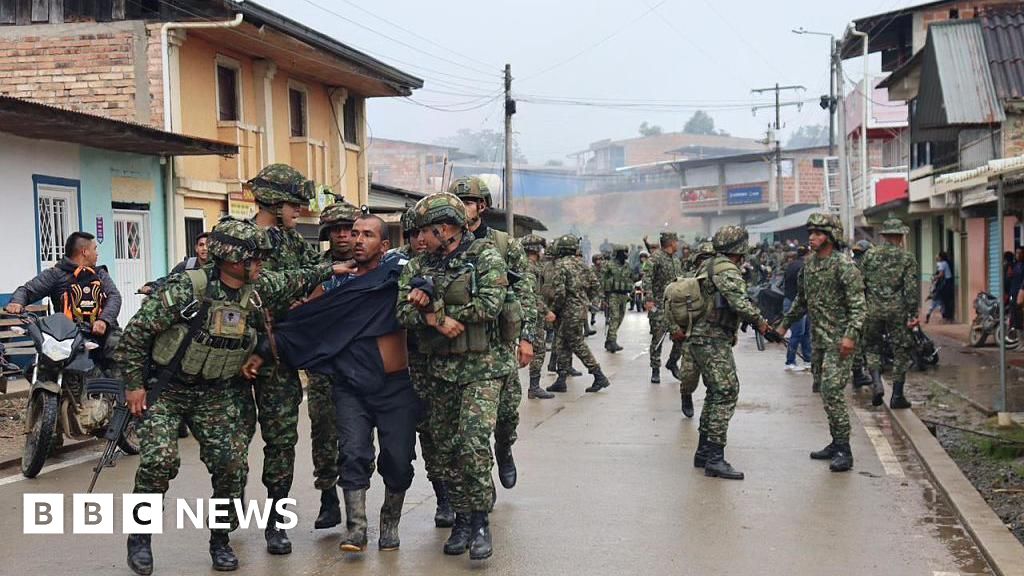Fifty-seven soldiers who had been held captive by locals in the mountains of Colombia since the weekend have been freed in a military operation, the Colombian defence minister has said. The minister, Pedro Sánchez, said that not a single shot had been fired in what he dubbed "Operation Justice". The soldiers were seized in the Cauca region, a stronghold of the EMC rebel group, which engages in cocaine production and trafficking. Mr Sánchez blamed the EMC for what he described as the soldiers' "kidnapping", saying that the locals who had seized them had been ordered to do so by the rebels. The Colombian military said the incident had been triggered by the arrest of a suspected EMC rebel on Saturday. As the soldiers prepared to airlift the suspect out of the mountainous area, they were surrounded by more than 100 people. A second military unit was then seized the following day by an even larger group of locals, General Erick Rodríguez of the Colombian army said. It was not the first time that members of the security forces were detained by locals, but the size of the group of soldiers was unusually large. In past similar instances, locals negotiated with humanitarian groups and the captured soldiers were released relatively swiftly. But this time, those holding the 57 refused to talk to any go-betweens, triggering the deployment of extra troops to the area to free the captive soldiers. Heavily armed reinforcements were deployed to the area and arrested 20 people, the defence minister said. According to estimates by the military, more than 90% of the inhabitants of the area depend on the cultivation of coca bushes - the plant used to make cocaine - for a living. The presence of soldiers in the area is therefore often seen as a direct threat. The region has also been blighted by the presence of several armed groups which extort farmers and landowners, and engage in illegal mining and cocaine trafficking.
Colombian army frees 57 soldiers held captive by locals
TruthLens AI Suggested Headline:
"Colombian Military Rescues 57 Soldiers from Local Captivity in Cauca Region"
TruthLens AI Summary
In a significant military operation labeled "Operation Justice," the Colombian army successfully freed 57 soldiers who had been held captive by local residents in the mountainous region of Cauca. The operation, which took place without any gunfire, was confirmed by Colombian Defense Minister Pedro Sánchez. The soldiers were taken hostage following the arrest of a suspected member of the EMC rebel group, notorious for its involvement in cocaine production and trafficking. As the military prepared to airlift the suspect, they were encircled by over 100 locals, leading to a tense situation that escalated the following day when a second military unit was also captured by an even larger group. Sánchez attributed the kidnapping to directives from the EMC, indicating that the locals were acting under the influence of the rebel group, which has a stronghold in the area. This incident marks a notable escalation, as previously, local negotiations with humanitarian organizations often led to the swift release of detained military personnel.
The region's socio-economic landscape complicates the situation, as over 90% of the local population relies on coca cultivation for their livelihood. Consequently, the presence of military forces is perceived as a direct threat, provoking hostility from the community. The Colombian military's response included deploying heavily armed reinforcements, resulting in the arrest of 20 individuals associated with the hostage situation. The area has been plagued by various armed groups engaged in extortion, illegal mining, and drug trafficking, making it a volatile environment for both locals and security forces. This incident underscores the complexities of the Colombian conflict, where local dynamics, economic dependencies, and the influence of armed groups intersect, posing challenges for military operations and community relations.
TruthLens AI Analysis
You need to be a member to generate the AI analysis for this article.
Log In to Generate AnalysisNot a member yet? Register for free.
